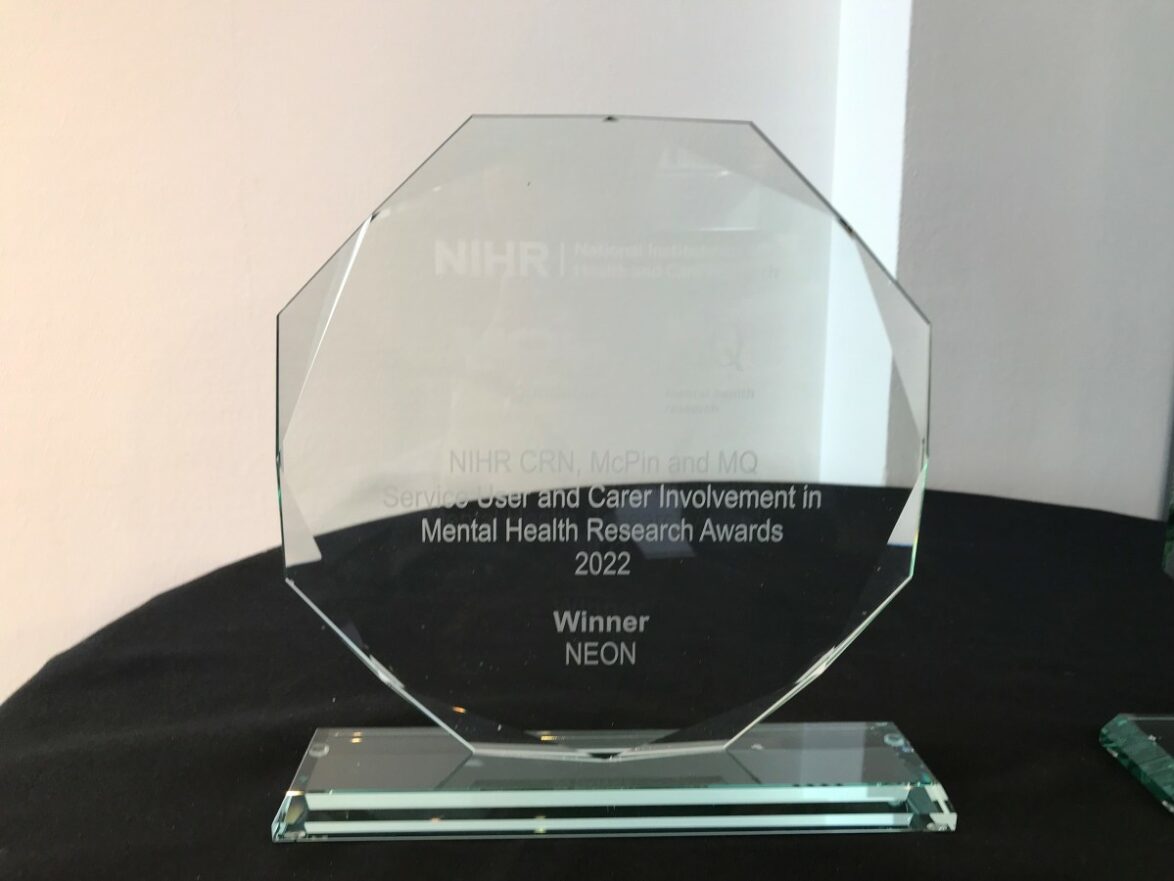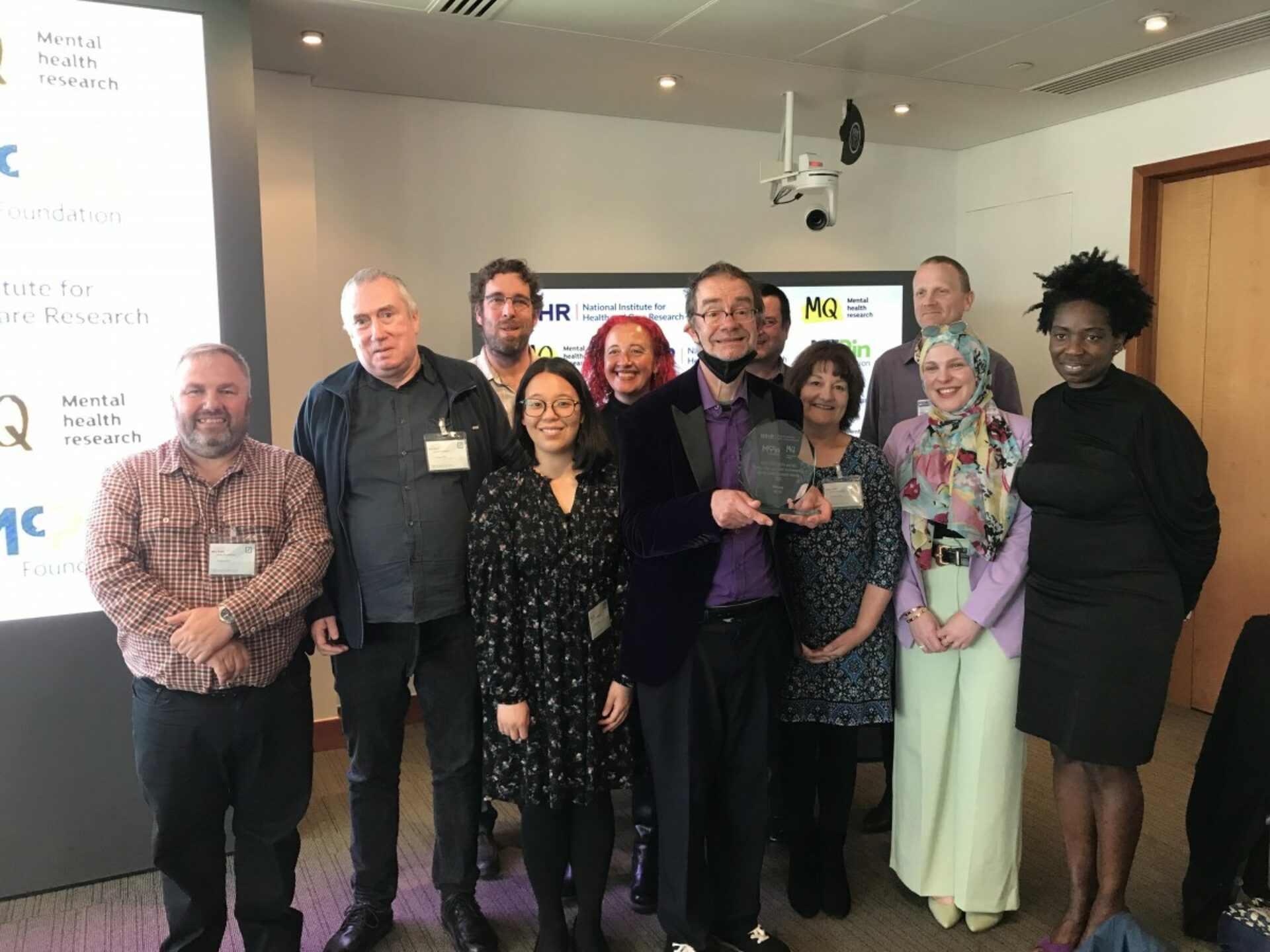McPin’s Head of Public Involvement reflects on how and why to celebrate good service user & carer involvement in research following the Public Involvement Awards – and what’s next.
Thomas Kabir
I like giving out good news!
In 2008 I started work for the NIHR Clinical Research Network. One of the things that I was asked to do was to coordinate an annual award for the ‘mental health study with the best service user involvement’. At the time there was a separate award for the study with the best carer involvement.
Do awards make a difference?
In my experience awards are a positive moment in a long research journey with peaks and troughs of emotion along way the way.
Each year we went through the process of identifying studies with good levels of involvement, finding people to judge the awards, and inviting the award winner and runner-up to our annual meeting where the prize would be presented.
It was one of the best parts of my job. It was very satisfying to see the efforts of service users and study teams being recognised and rewarded. I was particularly pleased that the award sometimes went to areas of research that we often don’t hear much about – for example, forensic research.
Evolving awards and lived experience judges
In 2014 I started work at the McPin Foundation. Due to a re-organisation of the NIHR Clinical Research Network a new way of continuing the award needed to be found.
This was important – to my knowledge there was no national award that recognised good service user or carer involvement in research. That is starting to change – we now also have the NIHR incubator awards which is great to see; they highlight involvement as part of their assessment criteria.
The McPin Foundation therefore teamed up with the NIHR and the charity MQ to continue the award in 2016. We took up the role of finding and supporting service users to work as judges for the competition.
I am delighted that this year we were able to give out the awards at an in-person event that was held on May 13th.
We got to meet winners and runners up, and it was really good to see so many of the service users from the NEON study at the event to receive their award, whom we know as we are linked to the study through a colleague who chairs the Lived Experience Advisory Panel.

What next?
Having been involved in this award for so long, this year’s process did give me an opportunity to think about how we could develop it going forwards – what might we change?
A few things came to mind:
- How can we celebrate service user-led research, survivor led studies? Currently only NIHR Clinical Research Network supported studies are eligible and that excludes a lot of good work.
- Could other major funders of research, such as The Medical Research Council and the Wellcome Trust, collaborate with us, or even establish their own awards for service user and carer involvement? What about awards for other health and social care studies as well?
- Could we widen the pool of researchers who can apply for the awards? Currently, only those who receive support from the NIHR Clinical Research Network can apply. What about research led by the voluntary sector or PhD students, which is often not supported by the network?
- Might we look to celebrate diversity, equity and inclusion within involvement work more specifically in these awards?
- The prizes for the awards are relatively modest, and we are usually able only to provide Amazon vouchers. Could we give more substantial prizes, particularly ones that may really help service users to develop their research ambitions, such as a small grant award?
- Whilst we do what we can, I would like the efforts of service users, carers, and researchers to be more fully recognised. Could a note of thanks come from someone such as the Chief Medical Officer? Could the Department of Health use its social media channels to publicise the awards and the winners?
At McPin we will be reviewing our next steps in the next few months – get in touch with ideas if you have thoughts on where we should put the celebratory emphasis going forwards.
“Each of these experiences have shaped my perspectives on what matters”
One of our judges, a LEAP member, shared their experience of being involved in the awards:
“I was delighted to be invited to judge the involvement awards this year.
I have lived experience of being involved in mental health research: as a participant, as a Lived Experience Advisory Panel (LEAP) member, and as a lived experience researcher.
Each of these experiences have shaped my perspectives on what matters in good quality research, particularly in involving people who are directly impacted by the research.
I hope they recognise the many hours of dedication and passion that people with lived experience commit to the projects they get involved with.
LEAP member judge
Awards that recognise and celebrate high quality involvement matter greatly. They raise the profile of the necessity and importance of lived experience involvement in research, and spotlight excellence in practice. Hopefully they also raise standards year after year by pushing researchers to consider issues of current relevance and apply creativity and innovation.
Most of all, I hope they recognise the many hours of dedication and passion that people with lived experience commit to the projects they get involved with, often motivated by a desire to improve the outcomes for people living with a mental health condition.
It was fascinating to read the different entries, which spanned a broad range of topics.
We also considered the level and types of support provided to people with lived experience, power-sharing, and the impacts of involvement.
LEAP member judge
They were judged on a number of different criteria, including service user and carer input at the early proposal stage, an area of the research cycle that people with lived experience are often excluded from.
We also considered the level and types of support provided to people with lived experience, power-sharing, and the impacts of involvement.
From a personal perspective, these are aspects of involvement that take thoughtfulness, sensitivity, and collaboration to develop, sometimes through trial and error. Done right, they can enhance the experiences of people involved in shaping the research, the experiences of research participants, and influence the research outcomes and impact.
Of particular importance to me is widening participation in research and involvement.
Over the years, it has been increasingly recognised that health research has more to do in addressing issues of inequalities, diversity and inclusion.
By involving a broader range of people in shaping the research, progress can be made towards reducing some of these barriers and inequalities, such as the focus of the research, better and more supportive ways to recruit diverse research participants, and ensuring the findings reach the people the research affects.
I was pleased to see some of the entries taking proactive approaches to thinking about currently under-represented groups within their research programmes and address these creatively.”
Hope for the future
I would like to go back to thanking the service users, carers, and researchers from the studies that have been considered for, and won, the awards down the years – and also find out what they are doing now.
Did these awards spur them on to do new and different involvement work in research? Is the diversity of people involved in research improving? I also wonder what impact the winners’ research has had on those affected by mental health issues.
I have seen some stunning involvement, and that hard work deserves to be recognised and rewarded. Perhaps if such good work was more often recognised and rewarded it would spur others to do more, and better, involvement work. That can only be a good thing.
My other hope is that more funders will start making achievements around lived experience involvement and expertise in research, and more substantial awards might be available in years to come.
